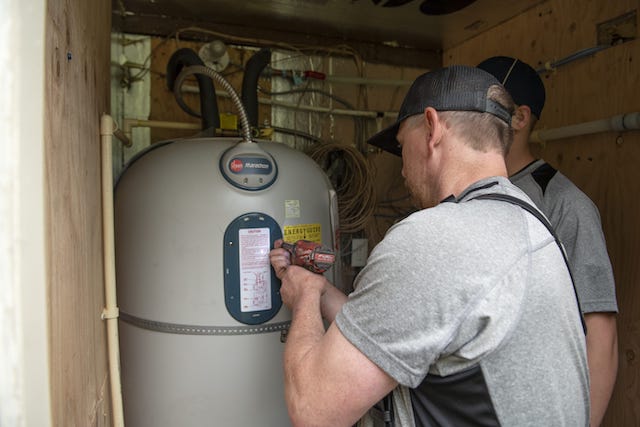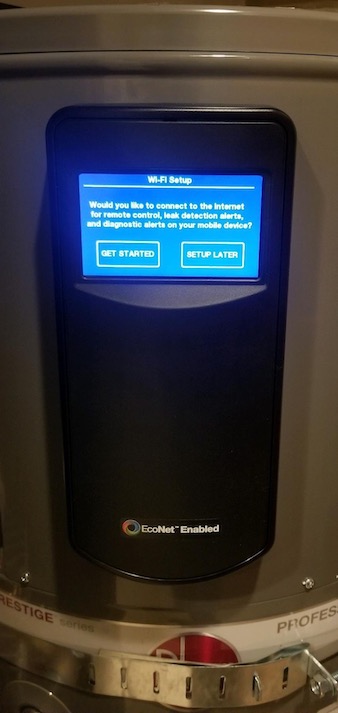Should you buy a Heat Pump Water Heater?

What is a heat pump water heater?
An old-fashioned tank-type water heater works via direct heat exchange. A gas flame heats the water directly above it, or an electrical current running thru an element heats the water that it is immersed in. But a heat pump water heater (also known as a hybrid water heater) works on a different principle, it functions more like an air conditioner or like the refrigerator in your kitchen. A heat pump works by collecting ambient heat and moving it from one area to another. You may have noticed that if you put your hand on the correct spot on the side or the back of your refrigerator, it will feel warm to the touch. The coils of the refrigerator are moving heat from the inside of the box to the outside room, leaving the inside of the box considerably cooler than the temperature of the room, and causing the space around the refrigerator to warm up a little bit in the process. Likewise, a heat pump water heater moves heat from the air around the water heater into the water stored inside the tank. Under the proper conditions, a heat pump water heater is more efficient, less costly to run, than the old-fashioned water heaters we are used to because it’s using something that already exists–the temperature of the room it is in–to do some of the work for us.
Estimates are that a heat pump water can save an average household between 30% and 50% of the energy every year that a regular water heater would consume. For you, the customer, this translates directly into lower utility bills! For the utility companies, this means less demand on the power grid, and less need to build new power plants and infrastructure. Energy conservation simply makes sense, for our families, for our finances, and for our communities!
That does NOT mean that a heat pump water heater is correct for every situation, of course.
Cost
A heat pump water heater costs more to purchase than a standard, old-fashioned water heater. Luckily, many local utilities in the Eugene and Springfield area are providing grants and significant financial help towards the initial cost of the heater.
Size
Your new heat pump water heater will probably be larger than your old heater, it will be taller and probably wider. Part of this is because ALL new water heaters are bigger than they used to be. And part of the size difference, of course, is because of the heat exchanger on the top of the heat pump water heater.
Location
Partly because of the size difference, your new heat pump water heater may need to be installed in a new location in your house. But size isn’t the only factor, of course. The new heater needs to be placed in an unheated space that is warm enough all year round for the heat exchangers to work efficiently, and it needs to have enough unimpeded airflow around it for the exchangers to function properly. The U.S. Department of Energy recommends:
“Heat pump water heaters require installation in locations that remain in the 40º–90ºF (4.4º–32.2ºC) range year-round and provide at least 1,000 cubic feet (28.3 cubic meters) of air space around the water heater.”
Petersen Plumbing does not recommend installing one of these heaters in a closet, in a very small room, or in the heated part of a house. That last part may need some explanation: we do not feel it makes economic sense to spend money to heat a room, only to place a water heater in it that will cool the room down as it functions. It’s simply too inefficient. We prefer to install heat pump water heaters in an unheated basement or garage, in an area that is protected and will not freeze, but that you are not spending money to heat.
Once you verify that you have a proper space for the heater to be installed, there are a few other things to consider.
Noise
Heat pump water heaters make more noise than an old-fashioned water heater, since the blower motor makes noise as it blows air across the coils. The heater should ideally be installed in a space where that noise won’t bother the occupants of the structure.
Re-piping and electrical wiring
If it’s not going to be installed in the same space the old heater was, you will need to rerun some piping, so that cold water can reach the heater and the heated water can reach the fixtures from the new location. In addition, you’ll need to run a condensate line from the heater to the outside of the house–like all air conditioners, heat pump water heaters produce condensation, which needs a safe place to be disposed of. And you’ll probably need an electrician to run wiring to the heater’s new location.

Management
A heat pump water heater is often called a “hybrid” heater because it has several modes it can operate in, from full heat-pump mode where the electrical elements are not used at all, to a hybrid mode where the heater may use both the heat pump and the electrical elements, to full-on electrical mode where the elements provide all of the heat. You can switch between the modes during the day and the week as the ambient temperature and your demand for hot water changes. Unsurprisingly, heat pump mode is the most cost-effective and electrical mode is the most inefficient. But if you have a lot of people in the house and a sudden demand for hot water, you’ll be glad it’s available! Bottom-line is, a heat pump water heater will probably take a bit more of your attention than the old “set-em and forget-em” heaters did.
Communicating with and controlling your new heater
Most heat pump water heaters manufactured these days appear to be “Smart Appliances”, they are designed to connect to your wifi network and can be monitored and controlled via an app on your phone or online thru the internet. This has some serious security implications!! Petersen Plumbing STRONGLY suggests that you have a computer networking specialist evaluate your home network and help you setup your new water heater in a private and secure manner. We are not computer consultants by trade, and we can’t be responsible for the safety of your computer network or of your personal data. We do know several local computer consultants that we trust and that we use ourselves. Feel free to send us an email if you’d like to know who we use and recommend.
At a MINIMUM, please make sure that you change the default User Name and the password associated with the water heater and your online account. Use a strong, unique password, and do NOT use a password that is easy to guess or that you have ever used elsewhere.
Bottom Line
Heat pump water heaters are very popular these days. Many public and private programs exist to help make them affordable for almost everybody. They can save energy, they can save you money in the long run, and–like most modern technologies–they require a bit more thought and planning to run safely and securely.
Just give us a call at 541-343-9339, if you’d like Petersen Plumbing to help you plan for and install your new water heater!
Current rebate programs available in your area:
Other Water Heater Articles from Petersen Plumbing
- Should you buy a Heat Pump Water Heater?
- You may qualify for a large rebate from your Utility on a heat pump water heater!
- Water heaters have changed a lot in the past few years! Read about the new Federal Water Heater Energy Efficiency Standards and how they will affect you.
- Is a Tankless Water Heater Right for Your Home?
Helpful Links
An excellent infographic
- The new Federal Water Heater Energy Standards have produced a burst of energy in new water heater design and technology. Here's a cool Infographic from the U.S. Department of Energy.
Misc Links
- Energy.gov - Selecting a New Water Heater
- Energy.gov - Sizing a Water Heater
- Energy.gov - Energy Cost Calculator for Electric and Gas Water Heaters
- Energy.gov - Estimating Costs and Efficiency of Storage, Demand, and Heat Pump Water Heaters
- Energy.gov - Heat Pump Water Heaters
- Energy.gov - How to Lower Your Water Heater Temperature
- Green Building Advisor - Water Heater Links
- Green Building Advisor - All About Water Heaters
- Consumer Reports - Water Heater Buying Guide